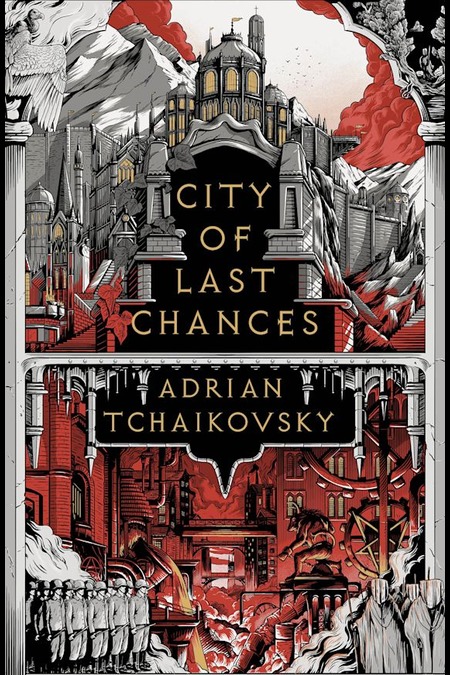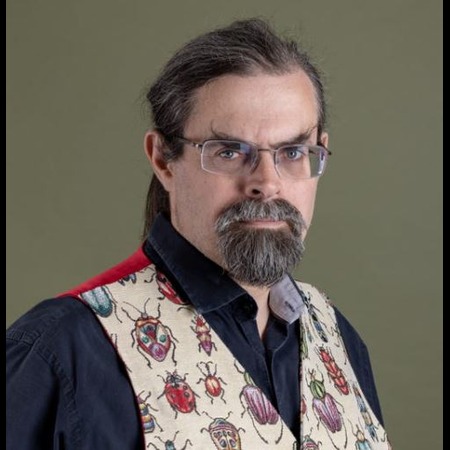(courtesy Bloomsbury Publishing)
Imagination, it likely goes without saying, sits at the very heart of all writing.
After all, how can a writer venture into worlds other than their known, into the souls of people they can’t possibly know except by creating them in their hearts and minds and fashion a riveting and emotionally compelling story unless they project far beyond reality and themselves?
To do all or any of that they need the ability to see and feel beyond themselves; in effect, to imagine [italicise], what a world not their own – and yet by its creation, it very much becomes theirs and theirs alone; until, of course, it is shared with their readers – looks and sounds, and most crucially feels like.
It’s an extravagant and wondrous act of creation and one writer who has real mastery of this act of conjuring something out of seemingly nothing is Adrian Tchaikovsky, whose superb fantasy novel, The City of Lost Chances, is a great many superlatively good things but chief among them is a brilliantly thrilling and profoundly affecting of imagination.
Set in the city of Ilmar in the conquered kingdom of Telmark, The City of Lost Chances is world building as it should be known, effortlessly – naturally there’s nothing effortless about this on the writer’s part but to the reader, the ease of its presentation and growth is a thing of seamless wonder and beauty – giving us a world where magic is part of everything and where, while otherworldly and amazing to mere mortals looking on, its corrosive effect is felt everywhere.
The old shyster would already have his exit planned. She trusted his shrewdness. He’d put a lid on this student situation, and then she and the Raven faction could get back to what was important — namely outmaneuvering their rivals so they’d be on top when the real fight came along.
For Ilmar is not a good or a healthy place to be in almost every respect.
The latest addition to the authoritarian, almost religious, unforgiving rigours of the Palleseen Sway, an imperial juggernaut from across the sea that is on a holy mission to bring perfection to everyone and everything – naturally, apart from a few hardy puritanical souls, those in positions of power, full or partial, are as corrupt and broken as anyone … unless they are giving orders of course – Ilmar is under the iron thumb of a cruel and punitive ruling elite.
Channelling The Handmaid’s Tale in its violently destructive religious zeal and a thousand empires past in its need too control every thought and every deed, The City of Lost Chances is a sage lesson in the fact that regardless of the ideological dressing that comes with it that every empire is the same – dedicated only to its perpetuity and the accumulation of power, riches and influence.
Hypocritical to its rotten core, the Palleseen Sway is all swagger and brutish rule; by way of contrast, at least those living in the city and whom we meet in chapters that highlight the ensemble-led rich and accessibly complex narrative while focusing on one individual, and by extension a part of Ilmar society, are honest about who they are and what they want.
Those like Yasnic, the last priest and indeed adherent to a religion whose God has great power to heal but who is capricious about its application and poisonously delusional about humanity and its worthiness to receive His gifts or Langrice, a tough and uncompromising woman who operates a sprawling tavern at the edge of the magical Anchorwood through which those desperate enough can journey to a plethora of strange and almost equally horrific lands.
Or Blackmane, a refugee from the neighbouring kingdom of Allor, also taken over by the Sway, whose magic has gone from being a thing of transcendent transformation and power to base commercialism that operates in the criminal underworld of a city consumed and defined by it, and Lemya, an idealistic student who believes in her professor, Ivarn Ostravar and his passion for keeping Maric history (they are the people of Ilmar) until she does not.
(courtesy official author site)
Each of these richly realised people, and an expansive number besides, fill The City of Lost Chances with the very best but often the very worst of humanity.
Trading in magic the way we buy groceries or fill up petrol at the bowser, they are, really, what people are like when the world has become so grindingly real and impossible that the only option is to just survive.
A great many people though don’t want to just do that, and The City of Lost Chances pulsates with building revolutionary fervour as people begin to believe that things can be better and that they can play a key part in making it so.
But in a city full of what the book’s back cover blurb enticingly calls “refugees, wanderers, murderers, madmen, fanatics and thieves, better is often an imperfect thing, rather ironically, and often non-existent.
For darkness sits at the heart of Ilmar, a city where the dead dance in an endless quest for life eternal, where monsters inhabit the very places people call home and where demons power a place that honestly is far more evil than the reputation of these horned beings from the Infernal Realms.
Does he truly believe it? She can’t know, and it isn’t important anymore. His listeners do, as though, from his mouth to their ears, the words enact that greatest of all magic feats and engender something from nothing. Ivarn Ostravar calls out for the freedom of Ilmar and the future listens.
Full of richly observant thoughts about the nature of people and the broken, terrible things they bring into being, even when in pursuit of something good and virtuously lasting, The City of Lost Chances sings with imagination that thrills with its ability to race far beyond your grasp of the world as you know it to be.
It reminds us too that while we might see imagination as a Disneyesque, Hallmark-ian thing of loveliness and goodness, that it is really about thinking about and bringing into creation all kinds of things, good and bad, and that once it unfurls in exciting potential, there’s really no going back.
Something has been born, something has been created and in The City of Lost Chances, at the hands of a writer so good you marvel on every page at his gift for language and what-ifs writ in ways wondrously good and terribly nightmarish, you are immersed deeply and completely into it, and you cannot pull yourself even if you wanted to.
And good lord in a small shrine, why would you want to?
The City of Lost Chances is brilliantly, superlatively done, a vessel of imagination so rich and vast and extravagantly beyond the fantasy norm that you wonder at how anyone conceived these things that is also groundedly and confrontingly real, serving up the very worst and best of us, and marvelling at our capacity to possibly destroy ourselves even as we somehow, but not without lingering harm much of the time, manage to pluck ourselves once more from the ruinous fire that is life.

